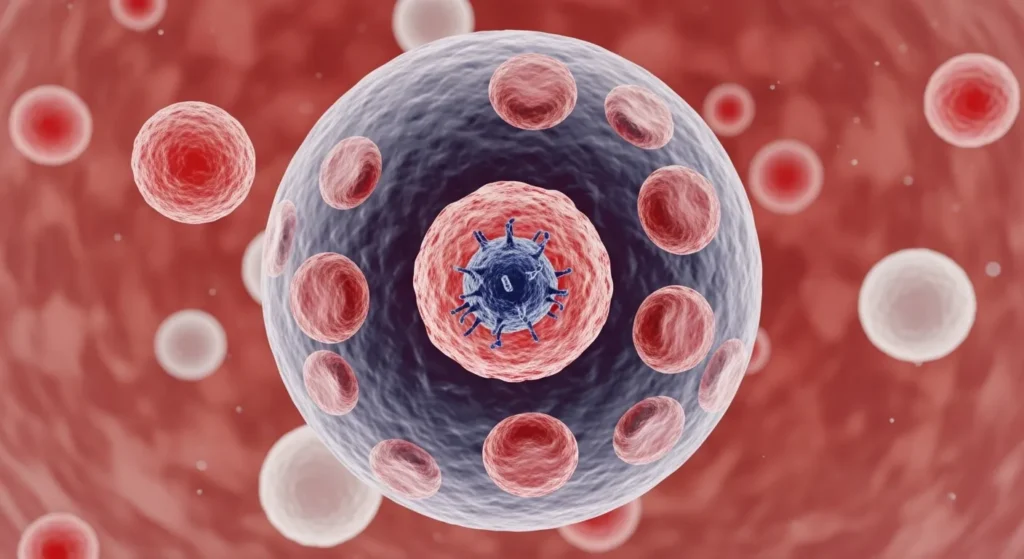Worried you’re losing hair after recovering from mono?
Mononucleosis, commonly caused by the Epstein-Barr virus, can stress the body significantly, and in some cases, this stress may lead to temporary hair loss.
In this article, we’ll explore does mono cause hair loss, how it happens, what type of hair loss it may trigger, and what you can do to recover. With expert tips, recovery timelines, and clear explanations, you’ll gain peace of mind and take proactive steps toward restoring healthy hair.
What Is Mononucleosis (Mono)?

Mononucleosis, often referred to as “mono”, is a viral infection primarily caused by the Epstein-Barr virus (EBV). It’s sometimes nicknamed the “kissing disease” because it spreads through saliva, but can also be transmitted through blood and other bodily fluids.
Common Symptoms and Causes
- Fatigue
- Fever
- Sore throat
- Swollen lymph nodes
- Enlarged spleen or liver
Mono mostly affects teenagers and young adults and can last for several weeks.
How It Affects the Body
Mono activates the immune system to fight the virus, leading to widespread inflammation and energy depletion. This prolonged internal stress can indirectly affect other parts of the body, including the hair follicles.
Why Mono Can Lead to Temporary Stress on the Body
Like other serious infections, mono can cause physiological stress, high fevers, and nutritional imbalances, all of which are potential triggers for telogen effluvium, a form of temporary hair shedding.
Does Mono Cause Hair Loss?
Yes, mono can cause temporary hair loss, primarily through a condition known as telogen effluvium (TE).
The Role of Physical Stress in Hair Loss
When your body experiences intense physical stress (like viral illness or high fever), it can push hair follicles into the resting phase, causing excessive shedding 2–3 months later.
Telogen Effluvium Triggered by Mono
Mono typically creates the perfect storm for TE:
- Immune response overload
- Fever
- Fatigue and poor appetite
- Hormonal shifts due to stress
Hair loss is not immediate but begins after recovery, once the body signals follicles to enter the resting phase.
Other Contributing Factors
- Inflammation: Can disrupt scalp health
- Nutritional Deficiencies: Poor appetite during mono may lead to lower iron, zinc, or protein intake
- Medications: Some medications used to manage mono symptoms could contribute to hair thinning
How Common Is Hair Loss After Mono?
Statistics and Medical Literature
While exact statistics are limited, telogen effluvium is a well-documented response to viral infections. Medical journals and dermatologists note TE as common after fevers, surgeries, and emotional or physical stress.
Anecdotal Evidence and Patient Reports
Online forums and trichology clinics frequently report patients experiencing shedding 2–4 months post-mono. Many describe handfuls of hair during showers or brushing — classic signs of TE.
Duration and Reversibility
The good news: TE caused by mono is not permanent. Hair typically regrows within 6–9 months, especially with proper support and nutrition.
Types of Hair Loss Potentially Linked to Mono
Telogen Effluvium
- Most common post-mono hair loss type
- Characterized by diffuse shedding all over the scalp
- Triggered by fever, stress, or nutritional imbalance
Alopecia Areata (Less Common)
In rare cases, mono may trigger autoimmune responses that lead to patchy bald spots due to alopecia areata.
Diffuse Shedding vs. Patchy Loss
- Diffuse shedding = TE
- Patchy bald spots = Alopecia areata (requires professional diagnosis)
How to Tell If Mono Is Causing Your Hair Loss
Timeline of Infection vs Hair Fall
Hair loss usually begins 2–3 months after mono infection — a delay typical of telogen effluvium.
Symptoms to Watch
- Widespread thinning (not localized)
- Hair coming out in clumps during brushing
- No signs of scarring or inflammation on the scalp
When to See a Doctor or Dermatologist
- If hair shedding lasts more than 6 months
- If bald patches appear
- If hair loss is accompanied by other unexplained symptoms
Recovery: Will Hair Grow Back After Mono-Induced Hair Loss?
Typical Recovery Timeline
- 0–2 Months: The Body recovers from mono
- 2–4 Months: Hair shedding begins
- 6–9 Months: Shedding stops and regrowth starts
Nutritional and Medical Support for Regrowth
- High-protein diet
- Biotin, iron, and zinc supplements
- Hydration and sleep hygiene
Preventing Further Hair Shedding
- Avoid crash diets or overexercising during recovery
- Minimize heat and chemical treatments
- Consider gentle shampoos and scalp massages
Expert Tips to Manage Hair Loss After Mono
Stress Reduction and Sleep Optimization
- Practice mindfulness or yoga
- Aim for 7–9 hours of sleep per night
- Reduce screen time before bed
Hair-Friendly Nutrition and Supplements
- Lean meats, eggs, beans (protein)
- Leafy greens and nuts (iron and zinc)
- Omega-3 fatty acids from fish or flaxseed
When to Consider Treatments Like PRP or Minoxidil
- If shedding is prolonged beyond 9 months
- If regrowth is thin or patchy
- After consulting a specialist like Dr. Rana Irfan for personalized treatment

FAQs About Mono and Hair Loss
Can mono cause permanent hair loss?
No, mono typically causes temporary hair loss. With proper care, most people experience full regrowth
How long after mono will hair fall occur?
Usually, 2–3 months after the infection, consistent with the telogen effluvium cycle.
Is shedding normal during recovery?
Yes, shedding is a natural response to the stress mono puts on the body.
Should I take any tests or see a specialist?
Yes, if hair loss is severe or doesn’t improve in 6–9 months, consult a trichologist or dermatologist. Blood tests for iron, vitamin D, and thyroid may help identify contributing factors.
Take Your Next Step
If you’re experiencing hair loss after recovering from mono, you’re not alone, and help is available. At our Islamabad clinic, Dr. Rana Irfan offers expert consultations and tailored hair restoration plans to help you recover confidently.
